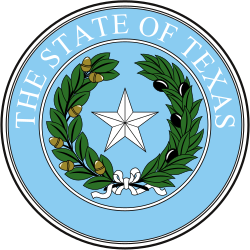Campaign
The first pre-election polls showed U.S. Representative Lyndon B. Johnson receiving only 5% of the vote, but Johnson ran a fierce campaign, barnstorming the state and emphasizing his close relationship with President Roosevelt. [3]
On Election Day, Johnson held a strong lead in the returns throughout the whole night, and with 96 percent of the ballots counted, Johnson held a 5,000-vote lead. [4] According to John Connally, future Governor and Johnson's campaign manager, local election officials began calling Connally's office and asking him about whether they should report the vote tallies. [5] Connally told them to report the votes, which allegedly allowed O'Daniel's political allies among the South and East Texas party bosses to know the exact number of fraudulent votes needed for O'Daniel to catch up to Johnson. [6] According to Connally,
The opposition then — Governor O'Daniel and his people — knew exactly how many votes they had to have to take the lead... They kept changing the results, and our lead got smaller and smaller and smaller. Finally, on Wednesday afternoon, we wound up on the short side of the stick and lost the election by 1,311 votes. I'm basically responsible for losing that 1941 campaign. We let them know exactly how many votes they had to have. [7]
In addition to O'Daniel's allies, state business interests aligned with former impeached and convicted Texas Governor "Pa" Ferguson had been concerned with O'Daniel's support of prohibition as Governor; they believed that he could do much less damage to their cause in the Senate. [8] The lieutenant governor, Coke R. Stevenson, was not in favor of prohibition, making his possible promotion to Governor a key selling point for the state's business interests in manipulating the election results. [9] In the final vote tally, Johnson fell short by just 0.23% of the vote. [10]
Allegations of fraud
In The Path to Power, Johnson biographer Robert Caro argues that the election results were manipulated in O'Daniel's favor by lobbyists from Texas' alcohol industry. O'Daniel was a staunch prohibitionist, and as Governor, he had proposed a bill preventing the sale of alcohol within ten miles of a military base; Caro notes how business interests feared the passing of this bill, as preparations for World War II had brought thousands of young soldiers into the region. To prevent the passing of this bill, lobbyists sought to elect O'Daniel to the Senate to place the "wet" lieutenant governor Coke Stevenson in the governorship, and hence rigged ballots in East Texas, swinging the election in O'Daniel's favor. [11]
This page is based on this
Wikipedia article Text is available under the
CC BY-SA 4.0 license; additional terms may apply.
Images, videos and audio are available under their respective licenses.






